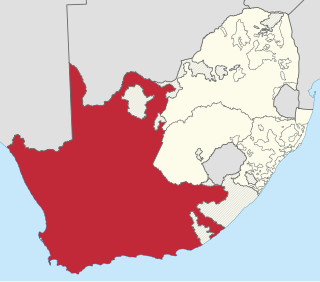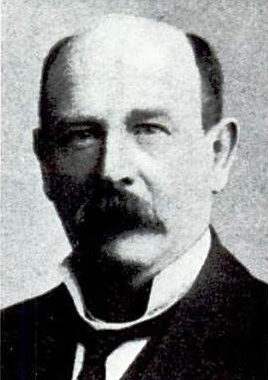Related Research Articles

The Union of South Africa was the historical predecessor to the present-day Republic of South Africa. It came into existence on 31 May 1910 with the unification of the Cape, Natal, Transvaal, and Orange River colonies. It included the territories that were formerly a part of the South African Republic and the Orange Free State.

The Province of the Cape of Good Hope, commonly referred to as the Cape Province and colloquially as The Cape, was a province in the Union of South Africa and subsequently the Republic of South Africa. It encompassed the old Cape Colony, as well as Walvis Bay, and had Cape Town as its capital. In 1994, the Cape Province was divided into the new Eastern Cape, Northern Cape and Western Cape provinces, along with part of the North West.
Guinn v. United States, 238 U.S. 347 (1915), was a United States Supreme Court decision that found certain grandfather clause exemptions to literacy tests for voting rights to be unconstitutional. Though these grandfather clauses were superficially race-neutral, they were designed to protect the voting rights of illiterate white voters while disenfranchising black voters.
A grandfather clause, also known as grandfather policy, grandfathering, or being grandfathered in, is a provision in which an old rule continues to apply to some existing situations while a new rule will apply to all future cases. Those exempt from the new rule are said to have grandfather rights or acquired rights, or to have been grandfathered in. Frequently, the exemption is limited, as it may extend for a set time, or it may be lost under certain circumstances; for example, a grandfathered power plant might be exempt from new, more restrictive pollution laws, but the exception may be revoked and the new rules would apply if the plant were expanded. Often, such a provision is used as a compromise or out of practicality, to allow new rules to be enacted without upsetting a well-established logistical or political situation. This extends the idea of a rule not being retroactively applied.

Voting rights, specifically enfranchisement and disenfranchisement of different groups, has been a moral and political issue throughout United States history.
Elections in South Africa are held for the National Assembly, provincial legislatures and municipal councils. Elections follow a five-year cycle, with national and provincial elections held simultaneously and municipal elections held two years later. The electoral system is based on party-list proportional representation, which means that parties are represented in proportion to their electoral support. For municipal councils there is a mixed-member system in which wards elect individual councillors alongside those named from party lists.

John Xavier Merriman was the last prime minister of the Cape Colony before the formation of the Union of South Africa in 1910.

General elections were held in South Africa on 15 September 1910 to elect the 121 members of the House of Assembly. They were the first general election after the Union of South Africa was created on 31 May 1910.
Williams v. Mississippi, 170 U.S. 213 (1898), is a United States Supreme Court case that reviewed provisions of the 1890 Mississippi constitution and its statutes that set requirements for voter registration, including poll tax, literacy tests, the grandfather clause, and the requirement that only registered voters could serve on juries. The plaintiff, Henry Williams, claimed that Mississippi's voting laws were upheld with the intent to disenfranchise African Americans, thus violating the Fourteenth Amendment. The U.S. Supreme Court did not find discrimination in the state's laws because, even though the laws made discrimination possible, the laws themselves did not discriminate against African Americans. The court found that any discrimination toward African Americans was performed by the administrative officers enforcing the law and that there was no judicial remedy for this kind of discrimination.

The South Africa Act 1909 was an Act of the Parliament of the United Kingdom that created the Union of South Africa out of the former Cape, Natal, Orange River, and Transvaal colonies. The Act also allowed for potential admission of Rhodesia into the Union, a proposal rejected by Rhodesian colonists in a 1922 referendum. The draft proposal was supported by the four colonial parliaments, but was opposed by Cape Colony premier W. P. Schreiner, who raised concerns that it would strip rights from non-white South Africans.
The system of racial segregation and oppression in South Africa known as apartheid was implemented and enforced by many acts and other laws. This legislation served to institutionalize racial discrimination and the dominance by white people over people of other races. While the bulk of this legislation was enacted after the election of the National Party government in 1948, it was preceded by discriminatory legislation enacted under earlier British and Afrikaner governments. Apartheid is distinguished from segregation in other countries by the systematic way in which it was formalized in law.

Disfranchisement after the Reconstruction era in the United States, especially in the Southern United States, was based on a series of laws, new constitutions, and practices in the South that were deliberately used to prevent black citizens from registering to vote and voting. These measures were enacted by the former Confederate states at the turn of the 20th century. Efforts were also made in Maryland, Kentucky, and Oklahoma. Their actions were designed to thwart the objective of the Fifteenth Amendment to the United States Constitution, ratified in 1870, which prohibited states from depriving voters of their voting rights on the basis of race. The laws were frequently written in ways to be ostensibly non-racial on paper, but were implemented in ways that selectively suppressed black voters apart from other voters.

Sir John Gordon Sprigg, was an English-born colonial administrator and politician who served as prime minister of the Cape Colony on four different occasions.
Black suffrage refers to black people's right to vote and has long been an issue in countries established under conditions of black minorities as well as, in some cases black majorities.

The House of Assembly was the lower house of the Parliament of South Africa from 1910 to 1981, the sole parliamentary chamber between 1981 and 1984, and latterly the white representative house of the Tricameral Parliament from 1984 to 1994, when it was replaced by the current National Assembly. Throughout its history, it was exclusively constituted of white members who were elected to office predominantly by white citizens, though until 1960 and 1970, respectively, some Black Africans and Coloureds in the Cape Province voted under a restricted form of suffrage.

The Representation of Natives Act No 12 of 1936 was legislation passed in South Africa which further reduced black rights at the time. The Cape province had a qualified franchise which had allowed a small number of blacks in the Cape to vote for the common roll in terms of the Cape Qualified Franchise. The qualified franchise dated back to the pre-Union period, when the Cape was a separate British colony; it also excluded poorer white men. The 1936 Act removed blacks to a separate roll – and halted the right to run for office; other earlier legislation removed the qualifications imposed in the Cape on whites.

Jacobus Wilhelmus ("J.W.") Sauer, was a prominent liberal politician of the Cape Colony. He served as Minister in multiple Cape governments, and was influential in several unsuccessful attempts to enshrine equal political rights for black South Africans in the constitution of the Union of South Africa. He was also a strong early supporter of women's rights and suffrage.

The Cape Qualified Franchise was the system of non-racial franchise that was adhered to in the Cape Colony, and in the Cape Province in the early years of the Union of South Africa. Qualifications for the right to vote at parliamentary elections were applied equally to all men, regardless of race.
The Coloured vote constitutional crisis, also known as the Coloured vote case, was a constitutional crisis that occurred in the Union of South Africa during the 1950s as the result of an attempt by the Nationalist government to remove coloured voters in the Union's Cape Province from the common voters' rolls. It developed into a dispute between the judiciary and the other branches of government over the power of Parliament to amend an entrenched clause in the South Africa Act and the power of the Appellate Division to overturn the amendment as unconstitutional. The crisis ended when the government enlarged the Senate and altered its method of election, allowing the amendment to be successfully enacted.

The Parliament of the Cape of Good Hope functioned as the legislature of the Cape Colony, from its founding in 1853, until the creation of the Union of South Africa in 1910, when it was dissolved and the Parliament of South Africa was established. It consisted of the House of Assembly and the legislative council.
References
- ↑ "Franchise and Ballot Act | South Africa [1892]". Archived from the original on 3 March 2010. Retrieved 9 June 2012.
- ↑ "Constructing the Union of South Africa; negotiations & contestations, 1902-10". Archived from the original on 16 June 2012.
- ↑ "1892. Cape Franchise & Ballot Act - the O'Malley Archives". Archived from the original on 27 July 2011. Retrieved 1 March 2011.
- ↑ "Newhistory.co.za". Archived from the original on 21 April 2013. Retrieved 9 June 2012.